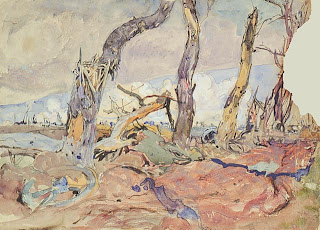IB 30/35
We focused on Paper 2 today. We looked at a Topic 1 essay question, which focused in on the short-term and long-term results of the First World War, and a Topic 5 essay on the Cold War. With the Topic 1 essay you were to write the introductory paragraph and outline your subsequent arguments and evidence. With the Topic 5 essay you were given a sample and were asked to read it and evaluate it using the Paper 2 markbands. I also had you outline the essay. We have an optional class on Tuesday, May 7th, where we'll look at the Paper 3.
Social 20-1
I gave you a list of upcoming important dates at the beginning of class that I'll post here on the blog as well. You had the entire class period to read Chapter 7 and complete the key terms and questions. The Chapter 7 Key Terms and Questions are due tomorrow. The Chapter 8 Key Terms and Questions will be due on Tuesday, May 7th.
Upcoming Important Dates:
- Chapter 7 Key Terms and Questions are due on Wednesday, May 1st
- Unit 2 WRA I is on Thursday, May 2nd
- Unit 2 Research Project is due on Monday, May 6th
- Chapter 7-8 Test is on Monday, May 6th (please see the study guide below)
- Unit 2 WRA II Essay is on Tuesday, May 7th
- Unit 2 Final Exam is on Monday, May 13th
Chapter 7-8 Test Study Guide:
This test is on Monday, May 6th. It will consist of 20-24 key terms in a matching section, and 3 short answer questions. Please study the following PowerPoint presentations:
- "The Holocaust"
- "8 Stages of Genocide" (see the Genocide Watch website: http://www.genocidewatch.org/)
- "Contemporary Examples of Genocide"
Please study the following notes packages/film study packages:
- 36 Questions About The Holocaust
- Turning Points in History: The Atomic Bomb (film notes)
- White Light/Black Rain (film notes)
- Shake Hands with the Devil (film notes + package)
- Unit 2 Worksheet (chapter questions for Chapter 7 and 8)
- make sure that you have read Chapters 7 and 8!
1. Please study the following key concepts/key people/key events:
- genocide
- crimes against humanity
- war crimes
- the Holocaust
- ethnic cleansing
- lebensraum
- Weimar Republic
- Final Solution
- decolonization
- successor state
- self-determination
- Wansee Conference
- Nuremberg Trials
- Mahatma Gandhi
- Jawaharlal Nehru
- Mohammed Ali Jinnah
- home rule
- Hutu
- Tutsi
- Romeo Dallaire
- Manhattan Project
- Hiroshima
- Nagasaki
- Robert Oppenheimer
- FDR
- Harry Truman
- Potsdam Conference
- Slobodan Milosevic
2. You should be able to answer any of the questions from the Unit 2 worksheet from Chapter 7 and 8.



